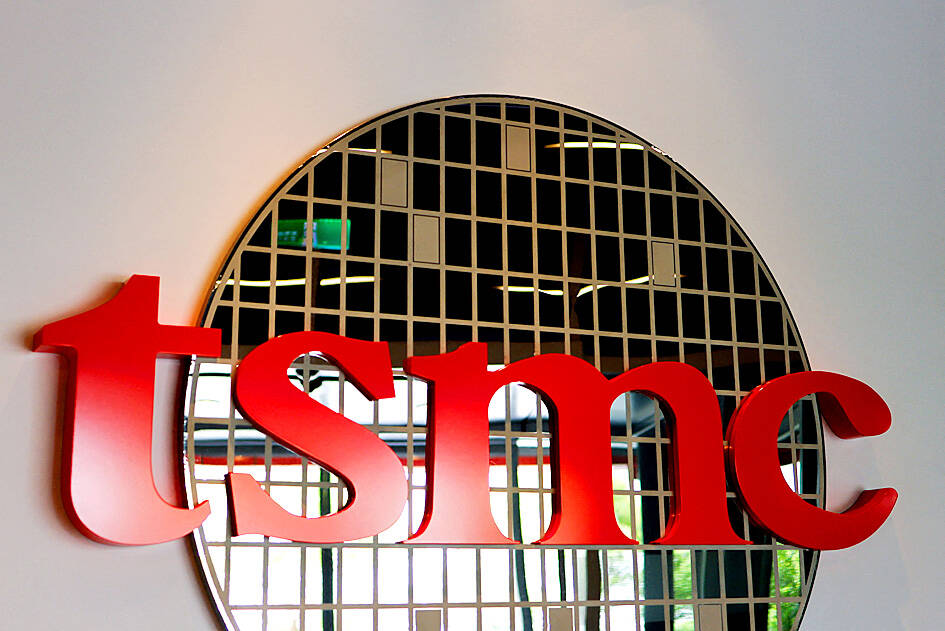The share price gap between Taiwan Semiconductor Manufacturing Co (TSMC, 台積電) and China’s biggest chipmaker is almost at its widest in nearly two decades, highlighting the difficulty Beijing faces in building up its domestic chip industry.
Bolstered partly by state-of-the-art chipmaking capabilities, TSMC has soared 48 percent this year in Taipei while Semiconductor Manufacturing International Corp (SMIC, 中芯國際) lost 7.5 percent, leaving the gap between the two stocks’ annual performance poised to be the biggest since 2005.
The chasm has occurred even as China’s largest semiconductor investment fund, known as Big Fund III, aims to develop the local sector amid US efforts to limit growth.

Photo: Ann Wang, Reuters
Boosting SMIC’s technology “is not something that can be achieved overnight, even with abundant funding,” said Shen Meng (沈萌), a director at Beijing-based investment bank Chanson & Co (香頌資本).
China is capable of making 7-nanometer chips, two generations behind the most sophisticated semiconductors in commercial production, but it is seeking to progress to 5-nanometer chips amid US curbs.
TSMC uses extreme ultraviolet (EUV) lithography equipment to produce more advanced 3-nanometer chips, but such tools cannot be sold to China due to export controls.
“Even if SMIC can produce chips using 5-nanometer technology, the cost would be at least 10 times higher than those produced at TSMC without EUV machines,” Bloomberg Intelligence analyst Charles Shum (沈明) said. “The technology gap isn’t just about reaching a certain level, it’s also about how effectively you can achieve it. ”
Although the Chinese government has unveiled few details on the third vehicle of the National Integrated Circuit Industry Investment Fund, Big Fund III’s formal name, investors are betting it would help solve some sector issues.
“The new fund is expected to focus on advanced technology, including wafer manufacturing, packaging, process control and equipment materials,” said Xiang Xiaotian, a director at Shanghai Chengzhou Investment Management Co (上海誠洲投資管理).
The fund might also target investments in AI chips, said Li Xun (李尋), an investment adviser at Guotai Junan Securities Co (國泰君安證券).

RUN IT BACK: A succesful first project working with hyperscalers to design chips encouraged MediaTek to start a second project, aiming to hit stride in 2028 MediaTek Inc (聯發科), the world’s biggest smartphone chip supplier, yesterday said it is engaging a second hyperscaler to help design artificial intelligence (AI) accelerators used in data centers following a similar project expected to generate revenue streams soon. The first AI accelerator project is to bring in US$1 billion revenue next year and several billion US dollars more in 2027, MediaTek chief executive officer Rick Tsai (蔡力行) told a virtual investor conference yesterday. The second AI accelerator project is expected to contribute to revenue beginning in 2028, Tsai said. MediaTek yesterday raised its revenue forecast for the global AI accelerator used

TEMPORARY TRUCE: China has made concessions to ease rare earth trade controls, among others, while Washington holds fire on a 100% tariff on all Chinese goods China is effectively suspending implementation of additional export controls on rare earth metals and terminating investigations targeting US companies in the semiconductor supply chain, the White House announced. The White House on Saturday issued a fact sheet outlining some details of the trade pact agreed to earlier in the week by US President Donald Trump and Chinese President Xi Jinping (習近平) that aimed to ease tensions between the world’s two largest economies. Under the deal, China is to issue general licenses valid for exports of rare earths, gallium, germanium, antimony and graphite “for the benefit of US end users and their suppliers

Dutch chipmaker Nexperia BV’s China unit yesterday said that it had established sufficient inventories of finished goods and works-in-progress, and that its supply chain remained secure and stable after its parent halted wafer supplies. The Dutch company suspended supplies of wafers to its Chinese assembly plant a week ago, calling it “a direct consequence of the local management’s recent failure to comply with the agreed contractual payment terms,” Reuters reported on Friday last week. Its China unit called Nexperia’s suspension “unilateral” and “extremely irresponsible,” adding that the Dutch parent’s claim about contractual payment was “misleading and highly deceptive,” according to a statement

Artificial intelligence (AI) giant Nvidia Corp’s most advanced chips would be reserved for US companies and kept out of China and other countries, US President Donald Trump said. During an interview that aired on Sunday on CBS’ 60 Minutes program and in comments to reporters aboard Air Force One, Trump said only US customers should have access to the top-end Blackwell chips offered by Nvidia, the world’s most valuable company by market capitalization. “The most advanced, we will not let anybody have them other than the United States,” he told CBS, echoing remarks made earlier to reporters as he returned to Washington